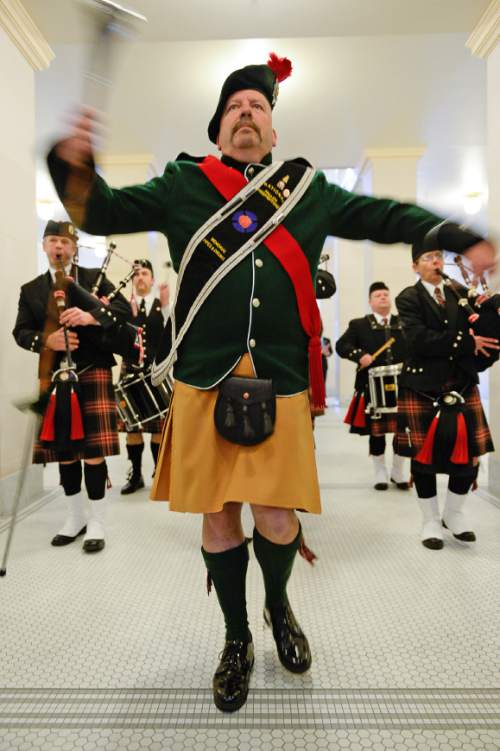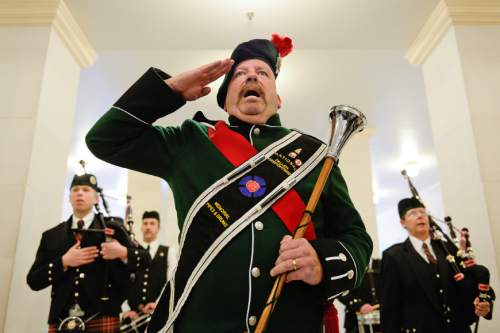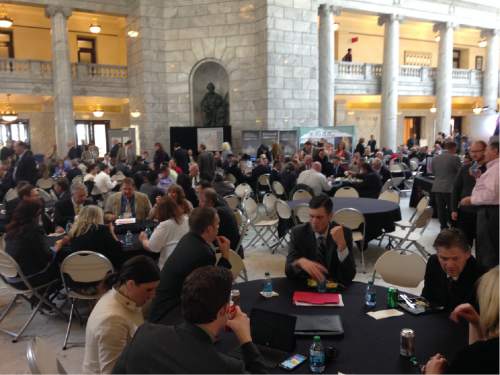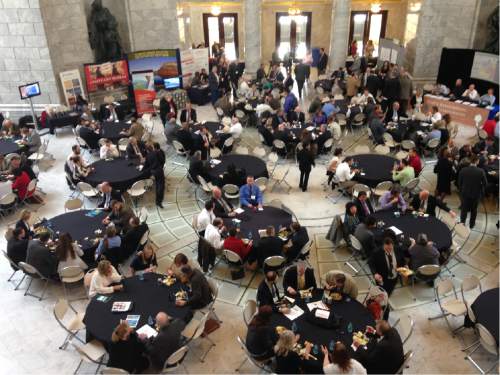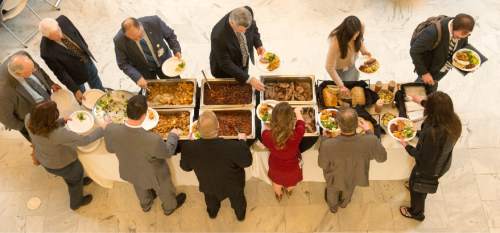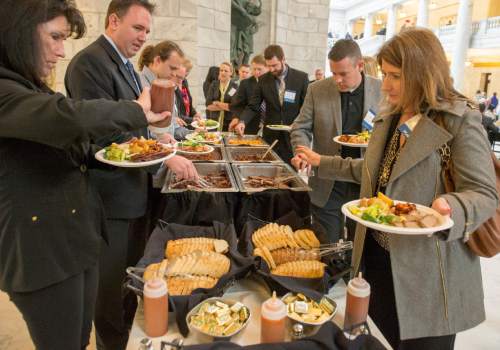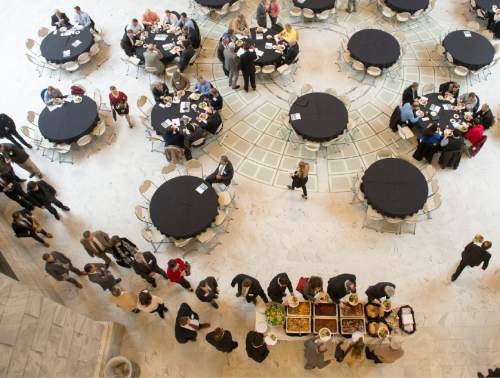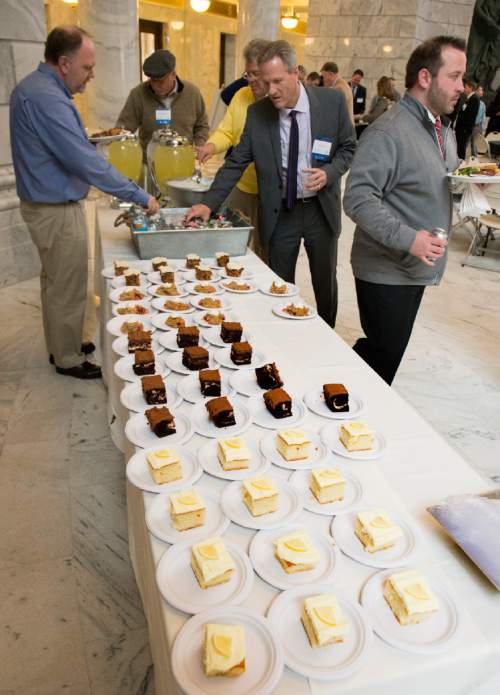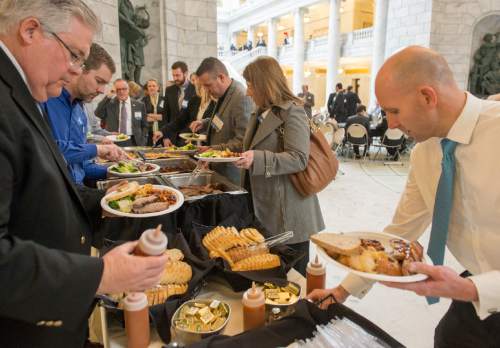This is an archived article that was published on sltrib.com in 2015, and information in the article may be outdated. It is provided only for personal research purposes and may not be reprinted.
Utah lawmakers this legislative session are receiving half as many free lunches as they did two years ago.
In 2013, special interests sponsored 32 lunches for lawmakers during the Legislature's 33 working days. This year, the number scheduled has dropped to 14.
Why the difference?
The Legislature changed its pay structure to eliminate what had been a financial incentive to accept free meals.
But while free lunches are waning, receptions are on the upswing. They are cheaper for sponsors than full-blown meals and also take less time for legislators who can stop by for a few minutes instead of investing an hour or more to sit, eat and listen.
Overall, the number of free events — breakfasts, lunches, dinners, snack breaks, receptions and family events — are down slightly from 103 in 2013, when the Legislature changed its rules. But there still are plenty of them: 91 this session. And they still raise questions about whether they give an edge to the special interests sponsoring them.
—
Incentives • Until two years ago, legislators received a $61 daily allowance from the state for meals during the session.
So when they were treated to free meals, they could pocket that allowance with no questions asked.
In fact, most lawmakers considered the meal allowance as part of their regular pay.
But then they raised their base salary and changed meal allowances so they would be reimbursed for their actual cost, based on receipts submitted.
The change has had a noticeable effect on special-interest meals.
The number of free lunches dropped from 32 in 2013 to 17 last year to 14 this year, according to official House and Senate social calendars obtained by The Salt Lake Tribune.
At the same time, receptions increased from 13 in 2013 to 18 this year, and breakfasts jumped from nine to 15, though many are more like receptions — with light breakfast fare (such as juice and bagels) offered for lawmakers who want to pass by quickly.
"I have noticed that there has been a reduced amount" of events since the pay change, said Senate President Wayne Niederhauser, R-Sandy. "I enjoy that because I really don't want to go to another reception after a long day in committees and on the floor."
He prefers receptions to meals. "We stop by to make sure we're hearing the voices out there," but he says that is usually a quick stop. "A dinner ends up being a two-hour thing, and that's not something in our favor."
—
One free lunch • The Utah Fire Caucus, representing the state's firefighters, is one group that still offers an annual free lunch, which occurred last week and is a good example of such events. It created a sight that would be the envy of any lobbyist seeking the ear of lawmakers.
Almost all legislators were corralled in the Capitol's Hall of Governors, and they listened for an hour to table chitchat about concerns on fire codes, tuition breaks for fallen public safety officers' families and amendments to firefighter retirement.
"We have talking points on several bills" for firefighters to discuss at tables as they ate, said Murray Fire Chief Gil Rodriguez, head of the group.
As legislators signed in and headed for the buffet line, firefighters from their hometowns joined them. Bagpipes provided entertainment. Top firefighters were honored as were some lawmakers for their support.
Rodriguez said it allows firefighters to say thanks, and also talk with a unified voice on legislation. "This is the place where we can get on the same page."
He added that the lunch is a much easier and more powerful way to communicate with legislators than trying to catch them in the hallway for one-on-one chats, "although we do that, too." (Firefighters even offer free saltwater taffy throughout legislative offices in plastic mini-fire hydrants to help remind lawmakers of them and their concerns.)
Sen. Curt Bramble, R-Provo, the Senate chairman of the fire caucus, said in an interview at the lunch, "I suspect every member here had three or four invites with lobbyists or interests, but these are men and women who put their lives on the line. Why wouldn't you take an hour to talk to them?"
Bramble says he also has noticed fewer group lunches offered, something he laments because he says they not only inform members on issues but also help members from both chambers and parties get know one another better.
"You can tie back a significant increase in the partisan divide in Washington to when officials, because of ethics rules, could no longer interact" at such gatherings, he said. "We're meeting with our stakeholders, today the firefighters. We're also meeting with our colleagues from the House and Senate. The collegiality, and the sense of being a legislator, is enhanced by these."
—
Events • The fire caucus is just one of 88 outside groups that have scheduled sponsored events this legislative session. A complete list is available online at sltrib.com.
Not surprisingly, many of those groups are asking lawmakers for something.
The Hale Centre Theatre is planning a dinner for lawmakers later this month, followed by a performance of "Ghost — The Musical." (Ethics rules require lawmakers to pay $20 a person for play tickets, but the dinner there is free.) The theater has requested $100,000 for actor pay from the Legislature this year.
Clark Planetarium is seeking $750,000 to upgrade its science exhibits. It staged an evening event for lawmakers and their families last week.
The Utah Natural History Museum is seeking $150,000. It had an evening dinner and family event for lawmakers at the museum earlier this month.
Health-industry groups are scheduled to host 15 events during the legislative session, and lawmakers have filed at least 42 bills directly related to that industry this year, most notably some dealing with the possible expansion of Medicaid in the state.
Some of the health groups sponsoring events include the Utah Hospital Association, Utah Medical Association, Utah Nurse Anesthetists, Huntsman Cancer Institute, Health Forum of Utah, Utah Public Health Association and Utah Dental Hygienists.
Education groups are scheduled to host nine events, and at least 61 education bills have been filed. Some of those groups include teacher unions, the Utah PTA and groups representing charter schools.
For the record, groups are scheduled to sponsor 15 breakfasts, 27 snack breaks, 14 lunches, 13 dinners, 16 receptions and six family events for lawmakers.
—
Effects • The events annually rekindle a debate about whether they give wealthy interests better access to lawmakers, and perhaps more influence.
Adding fuel to that are findings by The Tribune last month that $8 of every $10 in campaign donations raised by lawmakers came from special interests, and about a quarter of the Legislature did not raise a single penny from their voters.
"It's all about access," says Steve Erickson, who lobbies for some anti-poverty and environmental groups that cannot afford to offer meals or receptions.
"We may not be at a disadvantage," he says, noting most lawmakers are willing to talk for a moment in the hall with groups like his.
But without money for big events where lawmakers gather in large groups, "We have to work a lot harder," Erickson says.
Niederhauser sees disparity in access fading.
"Probably in times past [not having money for events] has been a disadvantage," he said, "but I think that's equalizing" with the change in pay structure and decisions not to have sponsored lunches in legislative-caucus meetings.
Besides, he adds, most lawmakers try to listen to all sides. "I hear from groups from A to Z. I try to give everybody a chance to speak to me."
House Speaker Greg Hughes, R-Draper, agrees that most lawmakers make an effort to hear a range of perspectives. That is tough when many interests want a chance to talk and time is short.
"It's a time game. Everybody's got to eat, so if you can provide a venue where someone can eat and listen at the same time," it helps, Hughes said. "It's a practical consideration."
Until five years ago, special interests had to report what events they held for lawmakers and how much they cost. But the Legislature changed the rules so that groups do not need to report events or costs if a majority of either House or any committee is invited. So virtually no events are formally reported anymore.


